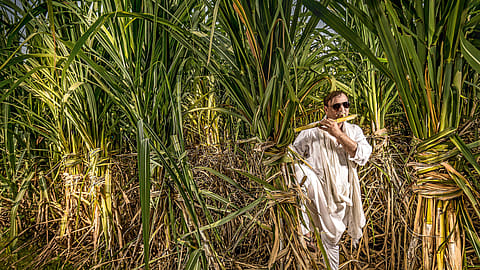After wheat, govt puts curbs on sugar exports from June 1
Raw, refined and white sugar placed under the "restricted" category; move aimed to maintain domestic availability and price stability.

After banning wheat exports on May 13, the central government has imposed restrictions on sugar exports from June 1 to meet the domestic demand and ensure price stability.
In a notification, the Directorate General of Foreign Trade (DGFT) says "in order to maintain domestic availability and price stability of sugar", the government has put raw, refined and white sugar under the "restricted" category from the existing policy of "free".
All sugar exports, excluding the fixed quantity of sugar being exported under the CXL quota and tariff-rate quota to the EU and the US, will be categorised as "restricted" and thus banned.
The exports after June 1 will be allowed on production with “specific permission” from the directorate of sugar under the consumer affairs ministry, it says.
“With effect from 1st June 2022 up to 31st October 2022 or until further orders, whichever is earlier, export of sugar is allowed only with specific permission from Directorate of Sugar, Department of Food and Public Distribution (DFPD), Ministry of Consumer Affairs, Food & Public Distribution,” says the notification.
The detailed procedure for issue of necessary permissions for the export of sugar will be notified separately by the department of food and public distribution (DFPD), the commerce ministry wing adds.
The government had earlier banned the export of wheat with immediate effect to curb the sudden spike in the global prices of wheat and the looming food security threat across several regions of the world. The intense heatwave across India also forced India, the second-largest producer of wheat, to pull the plug on export.
Recommended Stories
The ban has put pressure on the global supply chain as many global buyer nations banked on India for wheat as exports from the Black Sea region have stopped following Russia's invasion of Ukraine.
Rising global wheat prices and increased demand in overseas markets had pushed the prices of domestic supplies of wheat too. With India struggling to tame inflation, especially food inflation, the rise in wheat prices and the supply issues it may pose if unrestricted export of wheat is allowed to continue, was posing a major headache to the government.
Four days later on May 17, the central government clarified that the export restrictions on wheat will not apply to wheat consignments that have been handed over to customs for examination and have been registered into their systems on or before May 13. The government also allowed a wheat shipment headed for Egypt, which was already under loading at the Kandla port.
The decision was aimed at helping the movement of some stocks that had already arrived at the ports. Some 1.8 million tonnes of wheat grain were stuck at various ports after the government’s sudden decision to restrict its export.
(INR CR)
Meanwhile, after excise duty cuts on petrol and diesel, the Centre has allowed the import of crude soyabean oil and crude sunflower oil at nil rate of customs duty for two years. As per a finance ministry notification, the import of 20 lakh MT each of crude soyabean oil and crude sunflower per year will remain duty-free. On May 21, the government announced a cut in the central excise duty on petrol and diesel and a subsidy of ₹200 on LPG gas cylinders.